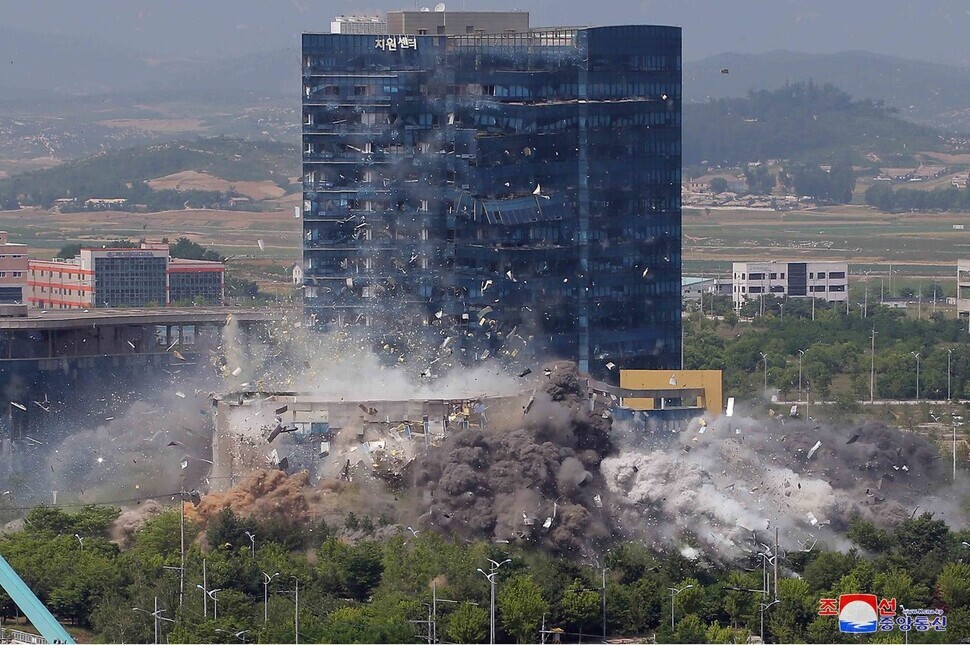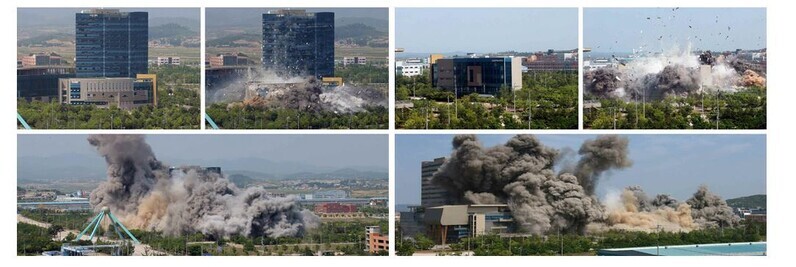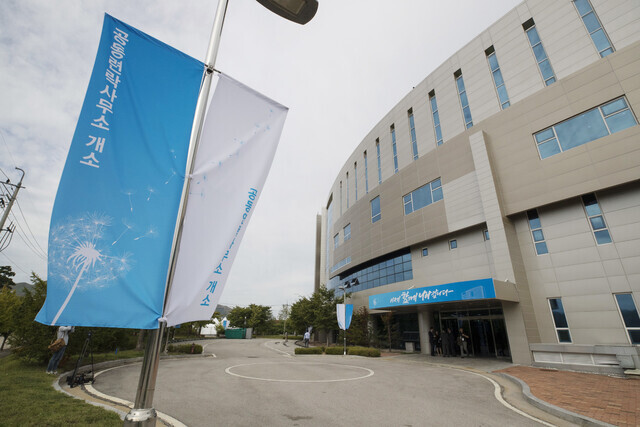hankyoreh
Links to other country sites 다른 나라 사이트 링크
[Editorial] N. Korea needs to halt escalations immediately and return to dialogue

North Korea blew up the Inter-Korean Joint Liaison Office in Kaesong on the afternoon of June 16. On June 13, Kim Yo-jong, deputy director of the Central Committee of the Workers’ Party of Korea (WPK), threatened that “before long, a tragic scene of the useless North-South joint liaison office completely collapsed would be seen.” She followed through on that threat three days later.
Thus, the liaison office, which was a symbol of constant inter-Korean communication, was destroyed just 21 months after it was opened in keeping with a promise made in the inter-Korean summit on Apr. 27, 2018. This is a truly shocking and regrettable development.

The joint liaison office was built with 17.7 billion won (US$14.5 million) of South Korean taxpayers’ money, and no rationale could justify North Korea demolishing it arbitrarily, without even discussing the matter. The liaison office was not the only thing that came down on Tuesday. The demolition also gravely damaged trust in the North Korean government and is sure to harden the views of South Koreans who have made every effort to understand North Korea’s plight.
With this demolition, North Korea shows that it meant business when it promised to switch to an adversarial approach in its dealings with the South. Exploding the liaison office (and inter-Korean agreements along with it) cements a negative impression in the international community that agreements with North Korea aren’t credible. This was a strategic error that damages not only inter-Korean relations but also the North’s credibility abroad.
On Tuesday morning, prior to the demolition, the North Korean army’s general staff announced that it would refortify areas that had been demilitarized according to inter-Korean agreements and would take action against balloons filled with propaganda leaflets launched over the border. The North is expected to rebuild guard posts in the demilitarized zone (DMZ) that it tore down in a trial withdrawal program according to the Sept. 19 Comprehensive Military Agreement.

There are also growing concerns that North Korea will permanently close the Kaesong Industrial Complex and redeploy a military unit that it had withdrawn to the north at the time of the complex’s construction. Another possibility is the demolition of tourism facilities at the Mt. Kumgang resort and the deployment of troops there. Refortifying those areas would put inter-Korean relations at risk of regressing to the time before the first inter-Korean summit in June 2000.
North Korea appears to be pressuring South Korea in the hope of reversing its fortunes. North Korea’s talks with the US have gotten nowhere since the summit in Hanoi last year concluded without a deal. North Korea is also frustrated with the South for failing to make much progress on inter-Korean cooperation because of its deference to the US. But we can’t help asking who exactly stands to gain from reversing the progress that South and North Korea have made on their path to peace and prosperity and the gradual erosion of the Cold War alignment on the Korean Peninsula.
If North Korea scraps the Sept. 19 Comprehensive Military Agreement as Kim Yo-jong has promised, it could spark a situation that’s beyond our control. North Korea must immediately halt further measures that raise military tensions. After convening the standing committee of the National Security Council on Tuesday, the Blue House expressed its disappointment, noting that North Korea’s actions had “betrayed the hopes of all who want the development of inter-Korean relations and the establishment of peace on the Korean Peninsula” and warning that it would “respond firmly if the North Koreans take measures that further worsen the situation.”
North Korea mustn’t take such warnings lightly. The South Korean government needs to mobilize all available measures. This is a challenging situation, but the time has come for the South and North Korean authorities to exert all their efforts in finding a solution through dialogue, with the awareness that history will hold them to account.
Please direct comments or questions to [english@hani.co.kr]

Editorial・opinion
![[Column] Samsung’s ‘lost decade’ and Lee Jae-yong’s mismatched chopsticks [Column] Samsung’s ‘lost decade’ and Lee Jae-yong’s mismatched chopsticks](https://flexible.img.hani.co.kr/flexible/normal/500/300/imgdb/original/2024/0512/3017154788490114.jpg) [Column] Samsung’s ‘lost decade’ and Lee Jae-yong’s mismatched chopsticks
[Column] Samsung’s ‘lost decade’ and Lee Jae-yong’s mismatched chopsticks![[Correspondent’s column] The real reason the US is worried about Chinese ‘overcapacity’ [Correspondent’s column] The real reason the US is worried about Chinese ‘overcapacity’](https://flexible.img.hani.co.kr/flexible/normal/500/300/imgdb/original/2024/0510/5217153290112576.jpg) [Correspondent’s column] The real reason the US is worried about Chinese ‘overcapacity’
[Correspondent’s column] The real reason the US is worried about Chinese ‘overcapacity’- [Editorial] Yoon’s gesture at communication only highlights his reluctance to change
- [Editorial] Perilous stakes of Trump’s rhetoric around US troop pullout from Korea
- [Guest essay] Preventing Korean Peninsula from becoming front line of new cold war
- [Column] The state is back — but is it in business?
- [Column] Life on our Trisolaris
- [Editorial] Penalties for airing allegations against Korea’s first lady endanger free press
- [Editorial] Yoon must halt procurement of SM-3 interceptor missiles
- [Guest essay] Maybe Korea’s rapid population decline is an opportunity, not a crisis
Most viewed articles
- 1[Column] Samsung’s ‘lost decade’ and Lee Jae-yong’s mismatched chopsticks
- 2Seoul’s plan to adopt SM-3 missiles is like wanting a sledgehammer to catch a fly
- 3S.K.-Japan joint history project to be revived
- 4Yoon rejects calls for special counsel probes into Marine’s death, first lady in long-awaited presse
- 5With Naver’s inside director at Line gone, buyout negotiations appear to be well underway
- 6Korea poised to overtake Taiwan as world’s No. 2 chip producer by 2032
- 7[Correspondent’s column] The real reason the US is worried about Chinese ‘overcapacity’
- 8S. Korean arrested and detained in Russia under espionage charges for first time in history, Moscow
- 9[Korea travels] Korea’s best stargazing spots put the Milky Way almost in reach
- 10[Guest essay] Maybe Korea’s rapid population decline is an opportunity, not a crisis